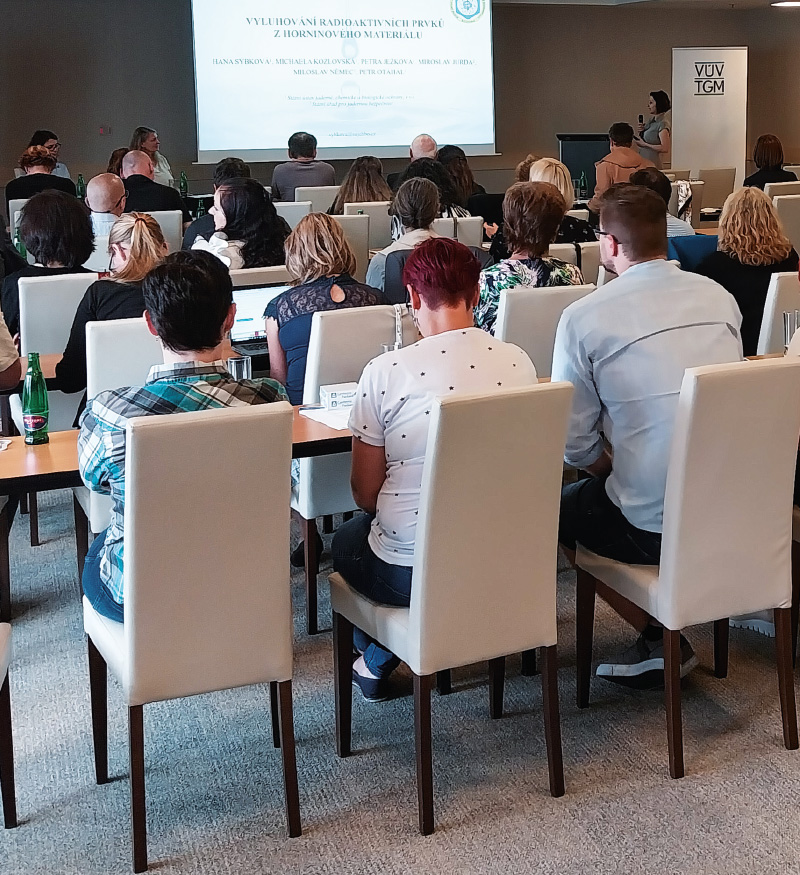The annual conference Radionuclides and ionizing radiation in water management took place on 21st and 22nd May 2024 at the Clarion Hotel in České Budějovice. The expert guarantor was Ing. Barbora Sedlářová (TGM WRI) and the organizational guarantor was Jan Kříž (ČVTVHS, z. s.). The conference was attended by 63 experts, of which 58 from the Czech Republic and 5 from Slovak Republic.
In the introductory lecture, Ing. Jan Varmuža (State Office for Nuclear Safety, SÚJB) informed about the amendment of the Atomic Energy Act from the point of view of monitoring radiation in surface waters. In the following presentation, RNDr. Jana Slimáková, Ph.D. (Public Health Authority of the Slovak Republic), summarized the experience of monitoring radiation in Slovac Republic. This was followed by a lecture on the amendment of the Atomic Energy Act from the point of view of monitoring tritium in waters, presented by Dr. Ing. Milan Hort (SÚJB). Then, Ing. Marcela Velkoborská (SÚJB) continued with information regarding the amendment of the relevant decrees on legislation for requirements for the supply and treatment of groundwater.
The following part dealt with the measurement and evaluation of the content of natural radionuclides with a possible increased content of natural radionuclides produced in groundwater treatment plants. The issue of refining the estimation of uranium-234 content was presented by Ing. Tereza Doksanská (National Radiation Protection Institute, NRPI) and practical experience and suggestions for revising the SÚJB recommendations were summarized by Ing. Tomáš Bouda (ALS Czech Republic). The next topic was deep radioactive waste repository in terms of characterizing suitable locations by determining the activities of long-lived radionuclides in groundwater. The topic was presented by Mgr. Michal Fejgl, Ph.D. (NRPI). Ing. Hana Sýbková (National Institute for NBC Protection) reported on the evaluation of the leaching of radioactive elements from rock material from uranium mining dumps used for motorway construction. Recently, a lot of attention has been paid to the issue of early detection of a possible radioactive event. Therefore, in his contribution, M.Sc. Michal Fejgl, Ph.D. (NRPI), presented the results of a currently developed device enabling the continuous determination of gamma activity in rainwater.
The next part dealt with the occurrence of artificial radionuclides in surface waters. RNDr. Diana Marešová, Ph.D. (TGM WRI), summarized findings on existing data on tritium volume activities and on their development in precipitation and surface waters in the Vltava and Elbe basins. Mgr. Enrico Mariaca (Water Research Institute, VÚVH) continued with information about volume activities in border watercourses in Slovakia. Ing. Eva Juranová, Ph.D. (TGM WRI), presented findings from the monitoring of carbon-14 in surface waters in the vicinity of the Dukovany and Temelín nuclear power stations. Other contributions dealt with the determination of long-lived radionuclides using Accelerator Mass Spectrometry (AMS), which can be used as a tracer of human nuclear activity. A lecture by Ing. Tomáš Prášek (Department of Nuclear Chemistry, FNSPE CTU) presented the initial measurement of uranium-236 in environmental samples. Ing. Edita Červenková (Department of Nuclear Chemistry, FNSPE CTU) reported on the determination of iodine-129 in river water as a tracer of nuclear accidents and on the effect of reprocessing spent nuclear fuel on the environment. The use of iodine-129 as an oceanographic tracer was presented by Ing. Miriam Mindová (Department of Nuclear Chemistry, FNSPE CTU). Ing. Jakub Sochor (Department of Nuclear Chemistry, FNSPE CTU, Faculty of Environmental Technology, UCT Prague) outlined the possibility of using ionizing radiation to solve the issue of degradation of antibiotic resistance genes in water. In conclusion, RNDr. Tomáš Soukup (Czech Metrology Institute) summarized the determination of radioactive indicators from the point of view of metrology, and Ing. Lenka Fremrová (Sweco Hydroprojekt, a. s.) prepared an overview of standards for the determination of radioactive substances in water and other related standards. The conference proceedings are available at: www.vuv.cz/wp-content/uploads/2024/05/Radionuklidy-2024_Sbornik.pdf.

The conference offered a platform for sharing professional experience, presenting the latest findings from research, and the possibility of establishing new collaboration between radiation safety and water management experts. The participants appreciated the wide range of topics discussed and the quality of presentations, which contributed to a better understanding of the issue of radionuclides in the environment. At the end of the meeting, it was recommended to organize the 18th conference on Radionuclides and ionizing radiation in water management in 2026.
This informative article has not been peer-reviewed.
